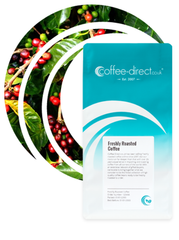Want to Try Something New? 100% Robusta Uganda Coffees
 Coffee-Direct has just added two rather unique coffees from Uganda to its ever-increasing range. Made from 100% Robusta coffee beans, Uganda Medium Roast, and Uganda Light Continental Roast offer some fabulous flavours and interesting characteristics for you to try:
Coffee-Direct has just added two rather unique coffees from Uganda to its ever-increasing range. Made from 100% Robusta coffee beans, Uganda Medium Roast, and Uganda Light Continental Roast offer some fabulous flavours and interesting characteristics for you to try:
Uganda Medium Roast Coffee has a delicious nutty, toasted grain flavour and aroma, with a hint of caramel, and a woody, earthy finish. It has an acidity level of 5, strength level of 6, and is best suited for cafetière and filter brewing methods.
Uganda Light Continental Roast Coffee has a strong toasted flavour and deep smokiness, for those who prefer a more robust cup of coffee. It has an acidity level of 4, strength level of 9, and is best suited for espresso brewing methods.
Robusta coffees have almost twice the caffeine content of Arabica coffees, which means they are great to drink first thing to set you up for the day, or help provide a boost of energy when needed. They are also ideal for creating blends; some people like to experiment and mix them with Arabica origin coffees.
Coffee is one of Uganda’s principal export crops, and although the country grows a fair amount of Arabica coffee, the majority of coffee produced is Robusta. Robusta coffee beans are mainly grown in the Kampala Forest region and around the Lake Victoria Crescent, being a native species of the area. The high altitudes, fertile volcanic soil, and ample rain and sunshine make it the perfect environment for coffee cultivation. Robusta coffee plants, as the name suggests, are robust and hardy, being more resistant to pests and diseases than Arabica. Over the years, improved farming and processing methods adopted by smallholder farmers has resulted in an improvement in the quality and complexity of flavours in their speciality coffees, that are largely produced without the aid of chemical fertilisers or pesticides. Coffee is grown throughout the year and there are usually two harvests.

